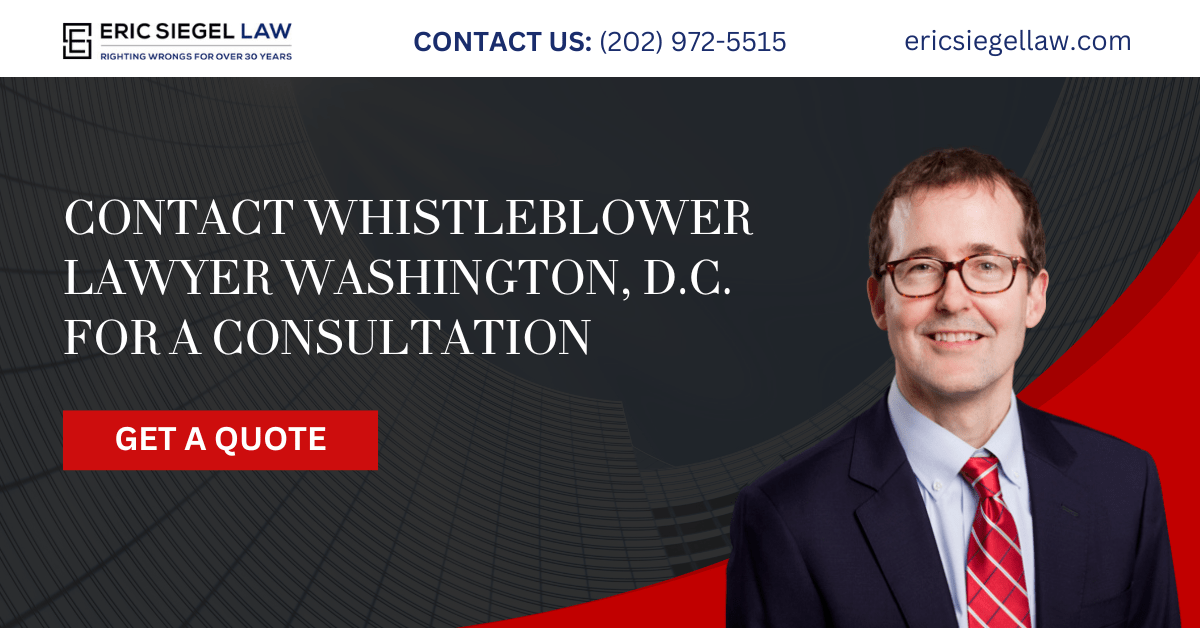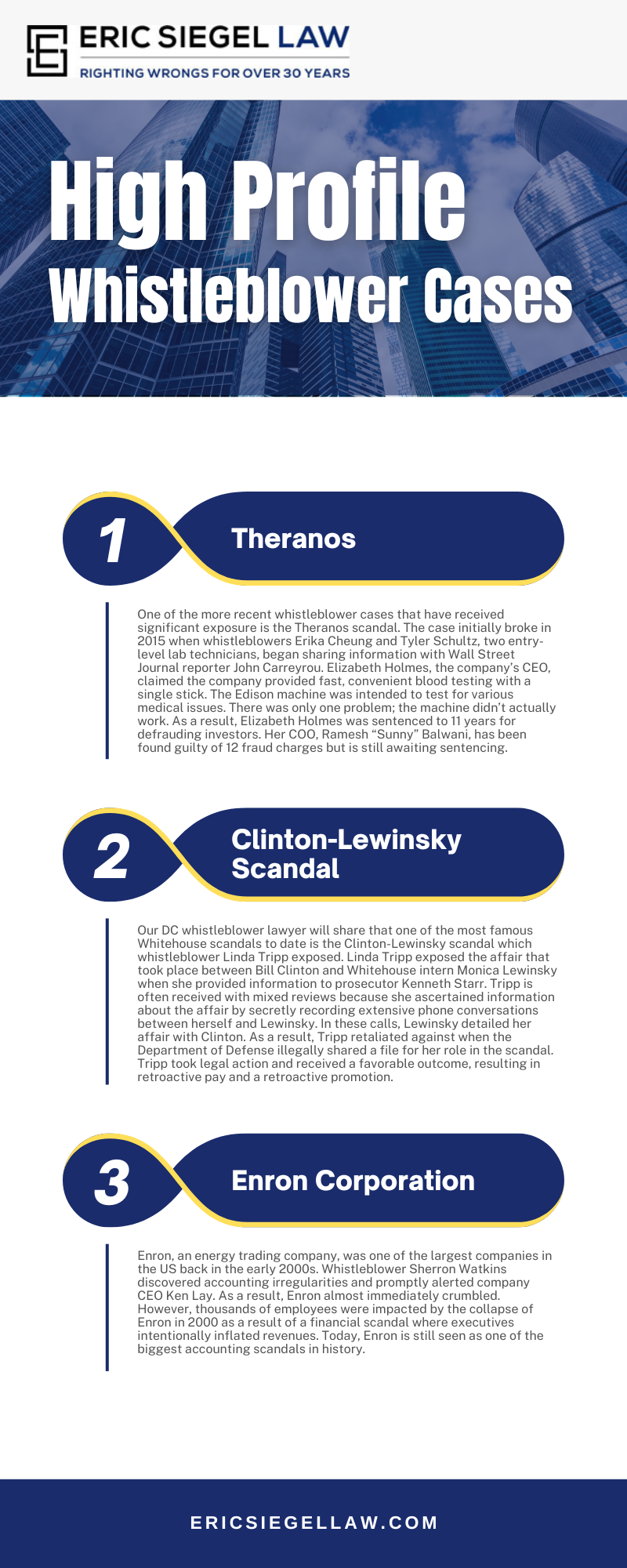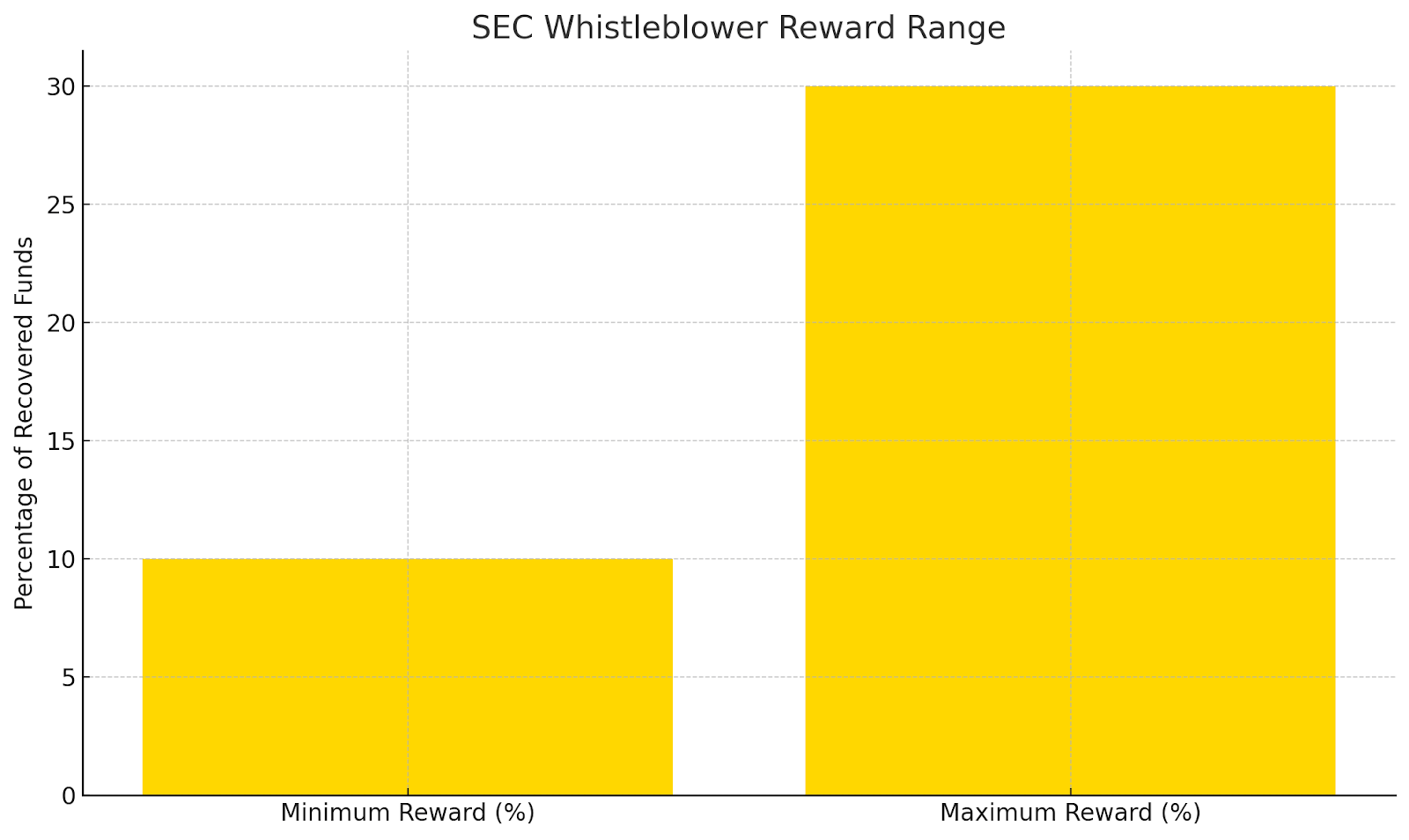
Whistleblower Lawyer Washington, D.C.
If you have witnessed illegal activity being done by an employer or employee, you can count our Washington, DC whistleblower lawyer to provide our full legal support. These unique situations put individuals in a difficult position, and in many cases, they can lead to serious consequences. However, whistleblowers are granted rights under the law that you are allowed to exercise. When you are seeking specialized legal services to depend on after reporting such activities, you can depend on a trusted and highly qualified legal professional to help you.
To prove a whistleblower retaliation claim in Washington, DC, you must show that you made a protected disclosure, your employer took adverse action against you, and the adverse action was motivated by your protected disclosure. If you win a whistleblower retaliation case, you may be able to recover a variety of damages, including back pay, front pay, reinstatement, emotional distress damages, punitive damages, and more.
Handling a case on your own comes with risks. With such an incredibly difficult type of legal case, you should explore your legal options and get the reliable support you need. Our accomplished and qualified team at Eric Siegel Law is highly familiar with whistleblower cases. With our decades of employment law experience, we have provided legal counsel for many clients who have reported or witnessed illegal activity in their workplace by a manager or fellow employee. Schedule a consultation today to receive personalized and transparent legal advice.
Important Information About Whistleblower Cases
Whistleblowers are individuals who report wrongdoing or misconduct within their organization. They play a vital role in protecting the public interest, but they can also face retaliation from their employers. When this type of negative action takes place, be sure to contact our DC whistleblower lawyer at Eric Siegel Law.
In Washington, DC, there are a number of laws that protect whistleblowers. These laws include:
- District of Columbia Whistleblower Protection Act (DCPWA): The DCPWA prohibits employers from retaliating against employees who disclose information about fraud, waste, abuse, or illegal conduct. The DCPWA also protects employees who refuse to participate in illegal activity.
- False Claims Act (FCA): The FCA allows whistleblowers to file lawsuits on behalf of the government against companies that have defrauded the government. Whistleblowers who win FCA lawsuits can receive a share of the government’s recovery.
- Public Servants Protection Act (PSPA): The PSPA prohibits discrimination against public employees based on their political affiliation or whistleblowing activities.
There are also many types of scenarios that whistleblowers can get involved in. Any criminal offense committed by an individual, organization, or government entity can be reported by a whistleblower. Because these cases often involve large companies, governmental bodies, or organizations, they are usually highly complicated and intricate. Whistleblower lawyers deal with many types of cases, which include fraud, corruption, misuse of funds, and embezzlement.
Benefits Of Hiring A Lawyer
There are numerous advantages to hiring our whistleblower lawyers who provide services to Washington, DC residents. It is essential to understand your right to speak out, and our lawyer can help you understand it. We can explain the information that you need to know, and can develop a strategy so that you can obtain positive case results. If there are damages that you can recover, our employment lawyer can help you obtain them. You do not need to go through the stress of a whistleblower case alone. Instead, count on our lawyer to be at your side. We are ready to help you fight back against unfair treatment.
High Profile Whistleblower Cases
Despite the several whistleblower protections in place for those who come forward, blowing the whistle is still considered controversial. Whistleblowers, at times, may be viewed as heroes, but in other situations, they may not always be cast in the best light. Often, whistleblowers expose organizations for crimes, fraud, unethical activities, etc. Because of this, they may be left to face backlash, not only from their organization but also from the general public, should their case become highly publicized. In addition, whistleblowers face other personal consequences that may impact their ability to retain employment within their industry. While this form of retaliation is breaking the law, it still takes place today, so those considering coming forward should seek skilled legal representation.
The following is a dive into some of the most high-profile whistleblower cases that have taken place throughout history and in recent years:
Theranos
One of the more recent whistleblower cases that have received significant exposure is the Theranos scandal. The case initially broke in 2015 when whistleblowers Erika Cheung and Tyler Schultz, two entry-level lab technicians, began sharing information with Wall Street Journal reporter John Carreyrou. Elizabeth Holmes, the company’s CEO, claimed the company provided fast, convenient blood testing with a single stick. The Edison machine was intended to test for various medical issues. There was only one problem; the machine didn’t actually work. As a result, Elizabeth Holmes was sentenced to 11 years for defrauding investors. Her COO, Ramesh “Sunny” Balwani, has been found guilty of 12 fraud charges but is still awaiting sentencing.
Clinton-Lewinsky Scandal
One of the most famous Whitehouse scandals to date is the Clinton-Lewinsky scandal, which whistleblower Linda Tripp exposed. Linda Tripp exposed the affair that took place between Bill Clinton and Whitehouse intern Monica Lewinsky when she provided information to prosecutor Kenneth Starr. Tripp is often received with mixed reviews because she ascertained information about the affair by secretly recording extensive phone conversations between herself and Lewinsky. In these calls, Lewinsky detailed her affair with Clinton. As a result, Tripp was retaliated against when the Department of Defense illegally shared a file of her role in the scandal. Tripp took legal action and received a favorable outcome, resulting in retroactive pay and a retroactive promotion.
Enron Corporation
Enron, an energy trading company, was one of the largest companies in the US back in the early 2000s. Whistleblower Sherron Watkins discovered accounting irregularities and promptly alerted company CEO Ken Lay. As a result, Enron almost immediately crumbled. However, thousands of employees were impacted by the collapse of Enron in 2000 as a result of a financial scandal where executives intentionally inflated revenues. Today, Enron is still seen as one of the biggest accounting scandals in history.
One of the most critical steps a whistleblower can take is to find an experienced lawyer who represents them and puts their interests first. While there are legal protections in place, whistleblowers can experience severe backlash for coming forward. Schedule a consultation to learn more about how our DC whistleblower lawyer at Eric Siegel Law can offer counsel and support when you need it the most. We are here to answer your questions on whistleblowing and craft a legal strategy you feel comfortable with.
Protection Against Common Types Of Retaliation
The main concern that many whistleblowers often report to our lawyers is the fear of retaliation. They are worried that their employer or the organization that they reported will find out what they have done and retaliate against them through a penalty or other serious consequences. Fortunately, it is illegal to retaliate against whistleblowers. Our employment lawyer will make that you have the protection you need to move forward safely as a whistleblower.
Fighting Back Against Retaliation For Blowing The Whistle
The act of coming forward and exposing wrongdoing on the part of a company is heroic. However, despite this, whistleblowers often experience backlash from taking action in reporting abuse and corruption. Unfortunately, although illegal, retaliation is quite common. Victims of retaliation can face consequences as a result, but it’s essential to know that it may be possible to seek legal recourse with help from Eric Siegel Law. Victims may receive compensation for the damages they have experienced as a result of workplace retaliation.
Exclusion From Meetings
Most employers have regularly scheduled meetings or training to keep their teams current on company goals and initiatives. Employers may try to sabotage or isolate employees by purposefully excluding them from such gatherings. If you all of a sudden have been left out of meetings that you previously got invited to attend, you may be the target of workplace retaliation. Your boss may be trying to set you up for failure and make you feel disconnected from your coworkers who are still being invited to meetings or training.
Unfairly Negative Performance Reviews
Usually, we have a general idea of how we are doing at work. We know deep down whether our performance has been great, or not so great. Receiving an unfairly negative performance review is never fun, but your boss must always rationalize their evaluation. If your boss seems to go out of their way to give you feedback that is unduly negative, without giving you constructive feedback, they may be engaging in retaliation against you. Reviews about performance are used to justify promotions, raises, and wrongful terminations. Performance reviews that are immensely negative, without true grounds for it, could be a strategy to deny advancement or defend their reasoning for why you are being fired.
Denial of Promotions and Advancement
There are only so many promotional opportunities available in the workplace. You may have worked hard to solidify being given a raise or a new desired position. Despite your efforts and exceptional performance, you may notice that you still cannot seem to land a promotion. Employers may prevent someone from advancing for discriminatory reasons. Employers may retaliate against workers by denying them promised or expected promotions. This form of retaliation can be difficult to prove, particularly if your employer has been distorting your performance reviews for quite some time.
More Work And No Increased Pay
While most people do not like to take on more work than is expected of them, sometimes doing so is necessary. But an employer may retaliate against a worker by requiring them to do significantly more without any raise in pay. Such expectations may come with excuses as to why you have to be the one to take them on. Your boss should not be forcing you to do more responsibilities without increasing your compensation. Keep in mind that an employer can ask an employer to do more without an increase in pay at times, but you must be wary if you appear to be singled out or if the amount of added work is unreasonable.
Steps To Take After Retaliation
While, at times, retaliation can be blatant, there are also subtleties to this type of treatment. It’s essential to take the proper steps as quickly as possible to safeguard your case. In addition to working with our experienced lawyer, it will take gathering evidence to support your claim and secure the best possible outcome. Victims of retaliation after whistleblowing should keep all evidence (emails, voicemails, text messages, recordings, etc.), write down an account of the events that transpired, speak with a manager or human resources about the retaliation, find an experienced lawyer, and consider filing a complaint with the EEOC.
Washington DC Whistleblower Infographic

Washington DC Whistleblower Statistics
In 2021, the Securities and Exchange Commission (SEC) awarded more than $564 million to 108 whistleblowers. This is the highest amount of money awarded to whistleblowers in a single year by the SEC. The SEC’s whistleblower program is designed to encourage people to come forward with information about securities fraud. Whistleblowers who provide information that leads to a successful enforcement action can receive a reward of up to 30% of the money recovered by the SEC.
 Washington DC Whistleblower FAQs
Washington DC Whistleblower FAQs
What If I Quit Voluntarily?
If you’ve hesitated to connect with our reputable lawyer because you quit your job voluntarily, it’s time to pick up the phone. If you felt compelled to quit your job because of discriminatory, harassment-based, or retaliatory treatment that made your workplace intimidating or abusive, you may still have a cause of action even if you weren’t fired or laid off.
The main reason why our firm offers risk-free consultations is that we believe that all hard-working people deserve to understand their rights under the law. If you’re potentially in a position to hold your employer accountable for either creating or failing to address a hostile work environment, you deserve to understand your options.
What Is Constructive Discharge?
Constructive discharge is a term that is used to describe the situation briefly outlined above. Essentially, when a hostile work environment develops and an affected employee is compelled to quit as a result of those circumstances, their employer can potentially be held legally and financially responsible for either creating that situation or failing to address it adequately.
“Hostile work environment” is a legal term with specific connotations. For circumstances to be treated as a hostile work environment by the courts and the Equal Employment Opportunity Commission (EEOC), they must be such that a reasonable person would find them to be abusive, intimidating, or otherwise hostile. That “hostility” must generally be rooted in conduct that can be classified as unlawfully discriminatory, harassing, or retaliatory.
If you quit your job because you were being subjected to either egregious or ongoing non-egregious treatment that a reasonable person would perceive as hostile, it’s time to connect with our employment law specialists to learn more about defending your rights as an employee.
What If I’ve Been Offered Severance?
If you quit your job and were offered some kind of a buyout, don’t sign any paperwork until an attorney has reviewed the terms of this offer. By signing any kind of buyout or severance agreement, you’ll almost certainly sign away your right to file legal action against your employer in the future. Such terms could tie your hands when it comes to holding your employer accountable for misconduct and securing any and all compensation that you deserve that exceeds the value detailed by the severance agreement. Call us first and do so quickly, as your employer has probably given you less than a week to review the proposal before you’ll either need to accept it or reject it. Our attorneys proudly offer legal support for whistleblowers in Washington, D.C. and the surrounding areas.
How Can I Protect My Rights While My Case Is Active?
Right now, you’re probably feeling the urge to vent. Don’t do so online or via text or email. These communications may potentially be used against you as your case evolves. Also, if you need to vent, don’t do so to your co-workers until you’ve spoken with our DC whistleblower lawyer about your case. Depending upon your circumstances, you may need to move forward with the greatest possible discretion.
Washington DC Whistleblower Glossary
At Eric Siegel Law, we understand how challenging it can be to come forward and report misconduct. Our Washington, D.C. whistleblower lawyers are dedicated to providing the legal guidance and support you need to protect your rights. The terms below are commonly used in whistleblower cases and can help clarify the process and protections available.
Protected Disclosure
A protected disclosure refers to information reported by an employee or individual about illegal activities, misconduct, or violations of laws within an organization. Under laws like the District of Columbia Whistleblower Protection Act (DCPWA) and the False Claims Act (FCA), individuals who make protected disclosures are legally safeguarded against retaliation. Examples include reporting financial fraud, health code violations, or misuse of government funds. For a disclosure to be protected, it must be made in good faith and pertain to matters covered by applicable whistleblower laws.
Adverse Employment Action
Adverse employment action describes negative actions taken by an employer that affect an employee’s job status or work conditions. In whistleblower cases, this typically refers to retaliatory measures taken after an employee reports misconduct. Examples include demotion, suspension, exclusion from meetings, denial of promotions, or unjustified negative performance reviews. Demonstrating a link between the protected disclosure and the adverse employment action is essential in a whistleblower retaliation claim.
Qui Tam Action
A qui tam action is a legal claim filed under the False Claims Act (FCA) that allows private individuals, known as relators, to sue companies or individuals on behalf of the government for committing fraud against government programs. Whistleblowers who bring forth qui tam actions can receive a portion of the funds recovered, which often serves as an incentive to report fraudulent activities. Examples include healthcare fraud, defense contractor fraud, or improper billing to government agencies.
Whistleblower Retaliation
Whistleblower retaliation occurs when an employer takes punitive actions against an employee because they reported misconduct or illegal activities. Retaliation can include termination, harassment, reduced work hours, or assigning unreasonable workloads without increased pay. Laws such as the Public Servants Protection Act (PSPA) and DCPWA prohibit retaliation and provide avenues for whistleblowers to seek remedies like reinstatement, back pay, and compensation for emotional distress.
Reinstatement
Reinstatement is the legal right of an employee to be restored to their former job position after being wrongfully terminated or demoted as retaliation for whistleblowing. Courts may order reinstatement as part of a successful whistleblower retaliation claim, ensuring the employee returns to the same position with the same salary, benefits, and seniority. This remedy aims to restore the employee to the position they would have occupied had the retaliation not occurred.
If you believe you have been retaliated against for reporting misconduct or need legal advice on whistleblower laws, our team is here to assist you. Schedule a consultation today to discuss your case with a dedicated Washington, D.C. whistleblower lawyer. Get the legal support you need in your workplace.
Eric Siegel Law, Washington DC Whistleblower Lawyer
1750 Pennsylvania Avenue #27007 Washington, DC 20038, United States
Contact Our Washington DC Whistleblower Lawyer Today
Whistleblowing is an act that can be incredibly challenging to do, and while there are systems in place to protect employees who come forward, they are still at risk of facing consequences that they shouldn’t have to. While retaliation is not something any employer should engage in, it’s still a common occurrence.
If you are a whistleblower and are in need of legal help, don’t wait to contact our qualified lawyer. We can help you understand your legal rights and protect you against any retaliatory action. However, you need to take action quickly as there is limited time to work on your case. To learn more about our DC whistleblower lawyer and the support Eric Siegel Law offers, call our office as soon as possible.



 Washington DC Whistleblower FAQs
Washington DC Whistleblower FAQs

